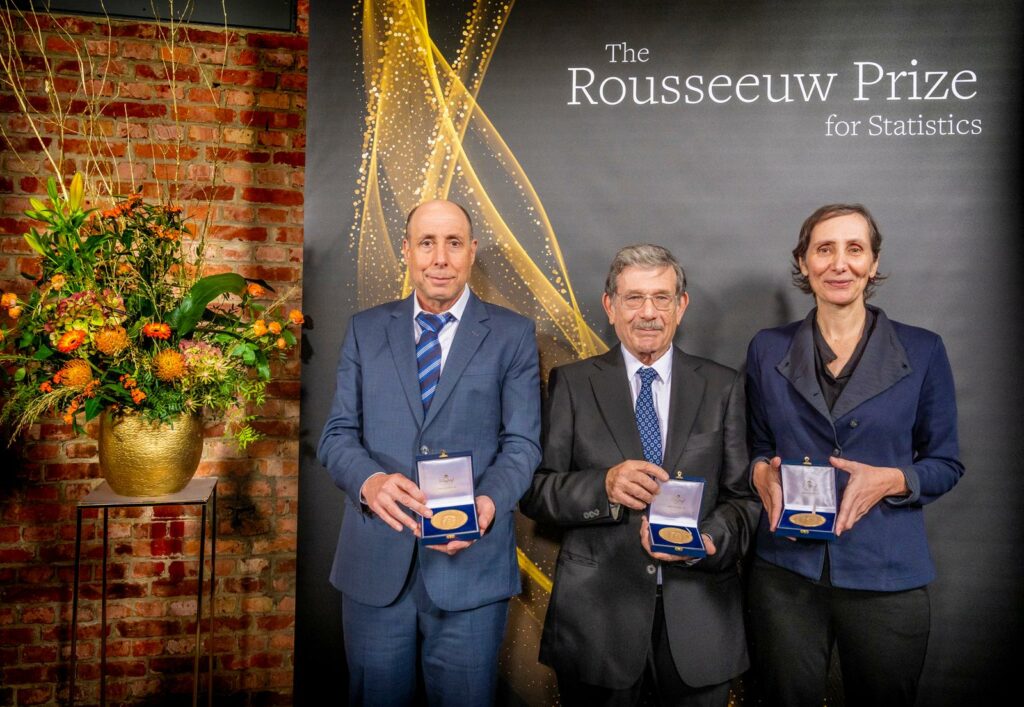An international jury appointed by the King Baudouin Foundation has selected the pioneering work on the False Discovery Rate (FDR) as the recipient of the biennial Rousseeuw Prize for Statistics 2024.
The Rousseeuw Prize, named after Belgian statistician Peter J. Rousseew who initiated the prize, aims at recognizing outstanding statistical innovations with impact on society. The award amount is 1 million US dollars, similar to the Nobel Prize in other fields. The first award in 2022 went to the topic of Causal Inference in Medicine and Public Health.
The 2024 prize was awarded to professor Yoav Benjamini and his former students Daniel Yekutiel and Ruth Heller from Tel Aviv University, Israel, at a recent ceremony at the Thermotechnisch Instituut at KU Leuven. Next year the university will celebrate its 600th anniversary.
The Israeli team was awarded the prize for its work on the False Discovery Rate (FDR), a methodology which limits the number of false discoveries without stifling the potential for true discoveries. Yekutieli and Heller have continued to innovate and expand the FDR methodology both independently and collaboratively, proposing methods to assess the reproducibility of scientific findings.
“Needless to say, I felt extremely happy when the news about the award arrived,” Professor Yoav Benjamini told The Brussels Times. “We were aware that our candidacy had been submitted to the selection committee. Our work on FDR has been cited by more than 100,000 scientists, but there was of course competition.”
He is Professor of Applied Statistics at the Department of statistics and operations research at Tel Aviv University and Member of the Israeli and the US National Academies of Sciences. In 2012, he received the Israel Prize for research in Statistics and Economics.
He explains that the FDR is based on standard sampling theory in scientific research. The problem arises when researchers are facing multiple research questions in the same study and the opportunity arises to see the data first and choose the most promising results.
The approach to this problem differs by research area. In epidemiology for example the issue is ignored, which results in many false discoveries such as “eat pizza and ketchup and avoid prostate cancer”. In contrast, in regulated drug research the approach is to adopt strict measures to assure that the probability of an error is limited.
How do you explain in simple terms for a non-statistician the idea behind the FDR? Benjamini gives the example of brain research where researchers look at many locations in the brain (measured by blood flow using MRI) trying to identify the locations that are active when performing a cognitive task.
“The higher the measured activity, the surer we are that indeed this is because of the performed task. But activity always fluctuates even without performing a task, so we need to decide on a threshold above which real special activity in the location is indicated. Starting from a low threshold, we increase the threshold, identifying less locations but making less errors, until for the first time the false discovery ratio is below the desired level.”
The FDR approach is relevant across science, he adds, and becomes almost necessary with the increase of the size and complexity of the research questions. Thus genomics (the study of the complete set of genes), proteomics (the study of proteins) and brain research have been the most devoted users of the approach.
Does the development of Artificial Intelligence (AI) make any difference for the relevance and use of the FDR formula? “I don’t think so. The uncertainty is inherent whenever trying to extract knowledge from experimental and observational data, including when the ability to run complex experiments increases and the number of questions that can be asked from the data becomes larger.
When coming to Belgium for the award ceremony, he was aware that Belgian universities have cancelled research projects with Israeli universities because of student protests against the war in Gaza. He was personally affected because a close friend of his daughter had been taken hostage by Hamas on 7 October.
“Our entire family was weekly in the streets demonstrating against the government, calling for a deal to return the hostages and end the war,” he said in his speech in Leuven. They did not succeed. His daughter’s friend was brutally murdered in captivity together with five other hostages in September.
“It’s my belief that science is not only rewarding the people engaged in it, but critically contributes to the peace and prosperity of humanity by sharing common goals across societal conflicts,” he concluded. “In this respect boycotting or avoiding such connections harms this goal. Let us shield science from politics.”

